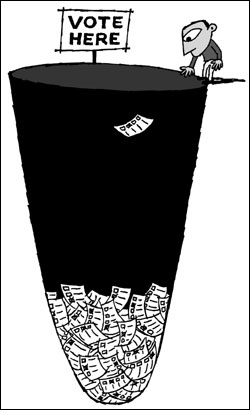ONE OF THE MORE discouraging developments in the 2000 presidential race was the near-complete lack of any chance for most states’ voters to participate in the selection of candidates. Both Bush and Gore had their party nominations essentially locked in before a single primary vote was cast. Later, the Fiasco of Florida masked the reality that one of the closest Electoral College elections in history was, in terms of popular vote, a close contest in only a handful of swing statesborder states on the red/blue frontier.
It might be worse in 2004. Here in blue Washington, it’s almost guaranteed to be.
One of the first orders of business when our state Legislature convenes in January will be a proposal, first floated by Gov. Gary Locke and lawmakers in September, to abolish the state’s March 2 primary. Democrats had already scrapped their plan to select presidential nominating delegates from both the primary vote and caucuses; instead, they’ll draw all of their delegates from Feb. 7 party caucuses held across the state. Assuming Dubya doesn’t keel over, Republicans already know who their nominee will be. So why not cancel the primary, saving a desperately needed $7 million?
Moreover, as The Seattle Times reported this month, only three of the nine major Democratic candidatesHoward Dean, John Kerry, and Dennis Kucinichare mounting meaningful campaigns in our state. Both Dean and Kucinich drew national momentum from well-attended events here. But Kucinich has virtually no chance of getting the nomination, and the state is considered Dean’s to lose in the Feb. 7 caucuses.
Washington is hardly unique. In state after state, the Democratic nomination boils down to a media-anointed “favorite”usually Deanwho will either gain or lose “momentum” depending on his showing. Only a handful of statesIowa, New Hampshire, South Carolina, Californiawill have a chance to bestow such momentum before the nomination is a fait accompli.
ELSEWHERE, VOTER desires are basically irrelevant. In many ways, party voters here have already “spoken”15,000 did, anyway, when they turned out on Aug. 25 to hear Dean at a Westlake Park appearance. That event remains a high point in Dean’s national campaign and signaled to D.C. insiders that the Internet-based Dean “revolution” involved real, flesh-and-blood people. The story of the 2004 campaign thus far has been Dean’s outsider assault on the Democrats’ Beltway establishment, which, from Democratic National Committee Chair Terry McAuliffe on down, is stacked with Clinton loyalists. (It was stacked with Gore loyalists, but the Clinton faithful mounted a purge after the 2000 debacle.)
Clintonites are both more conservative and D.C.-savvy than Dean’s crowd, but they haven’t united around a single alternative candidate. The pressure is on for them to do so and for the party itself to settle on a challenger to Bush, both to avoid a destructive intraparty battle and to start raising money to try to compete with Dubya’s anticipated $200 million campaign war chest. Bush’s record-breaking fund-raising prowess is also why Dean and then Kerry recently announced that they, like Bush, were opting out of the federal matching system, which limits donation amounts and spending but provides a matching taxpayer subsidy. The race among Democratic hopefuls now is over who can get more financial backing from big corporations and other donors.
THIS IS THE LEVEL at which the contest is being waged: deadly serious, for enormous stakes, and far above the heads of voters. If our opinions in the election don’t conform to the choices we’re offered, it’s our opinions, not the choices, that will be changed.
Such is the reality in most states. It’s why, among those desperate to get Bush out next year, an organized movement is now afoot to move money, volunteers, and even voters to states on the red/blue frontier, states whose Electoral College votes could conceivably go to either party in a close election.
Washington isn’t one of those states. If Bush has a shot here, the election won’t be close.
What could help? Abolishing the Electoral College, of course, so that in our country each person’s vote counts the same. But that won’t happen in our lifetimes, because too many smaller states that now enjoy disproportionate influence would need to ratify the necessary constitutional amendment.
Viable thirdand fourth, fifth, and sixthparties could also help, bringing needed choices and debate to the ballot. Laws are currently designed to reinforce the two-party duopoly, but nothing in our Constitution demands it.
Such reforms are a long-term project. Ultimately, it’s up to us, now and in 2007, 2011, and so forth, to realize that the best opportunities to help pick the nation’s president now come more than a full year before the actual election. By then, our votes are an afterthought.







